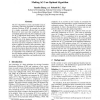Free Online Productivity Tools
i2Speak
i2Symbol
i2OCR
iTex2Img
iWeb2Print
iWeb2Shot
i2Type
iPdf2Split
iPdf2Merge
i2Bopomofo
i2Arabic
i2Style
i2Image
i2PDF
iLatex2Rtf
Sci2ools
141
click to vote
IJCAI
2001
2001
Making AC-3 an Optimal Algorithm
The AC-3 algorithm is a basic and widely used arc consistency enforcing algorithm in Constraint Satisfaction Problems (CSP). Its strength lies in that it is simple, empirically efficient and extensible. However its worst case time complexity was not considered optimal since the first complexity result for AC-3 [Mackworth and Freuder, 1985] with the bound O(ed3 ), where e is the number of constraints and d the size of the largest domain. In this paper, we show suprisingly that AC-3 achieves the optimal worst case time complexity with O(ed2 ). The result is applied to obtain a path consistency algorithm which has the same time and space complexity as the best known theoretical results. Our experimental results show that the new approach to AC-3 is comparable to the traditional AC-3 implementation for simpler problems where AC-3 is more efficient than other algorithms and significantly faster on hard instances.
Related Content
| Added | 31 Oct 2010 |
| Updated | 31 Oct 2010 |
| Type | Conference |
| Year | 2001 |
| Where | IJCAI |
| Authors | Yuanlin Zhang, Roland H. C. Yap |
Comments (0)

